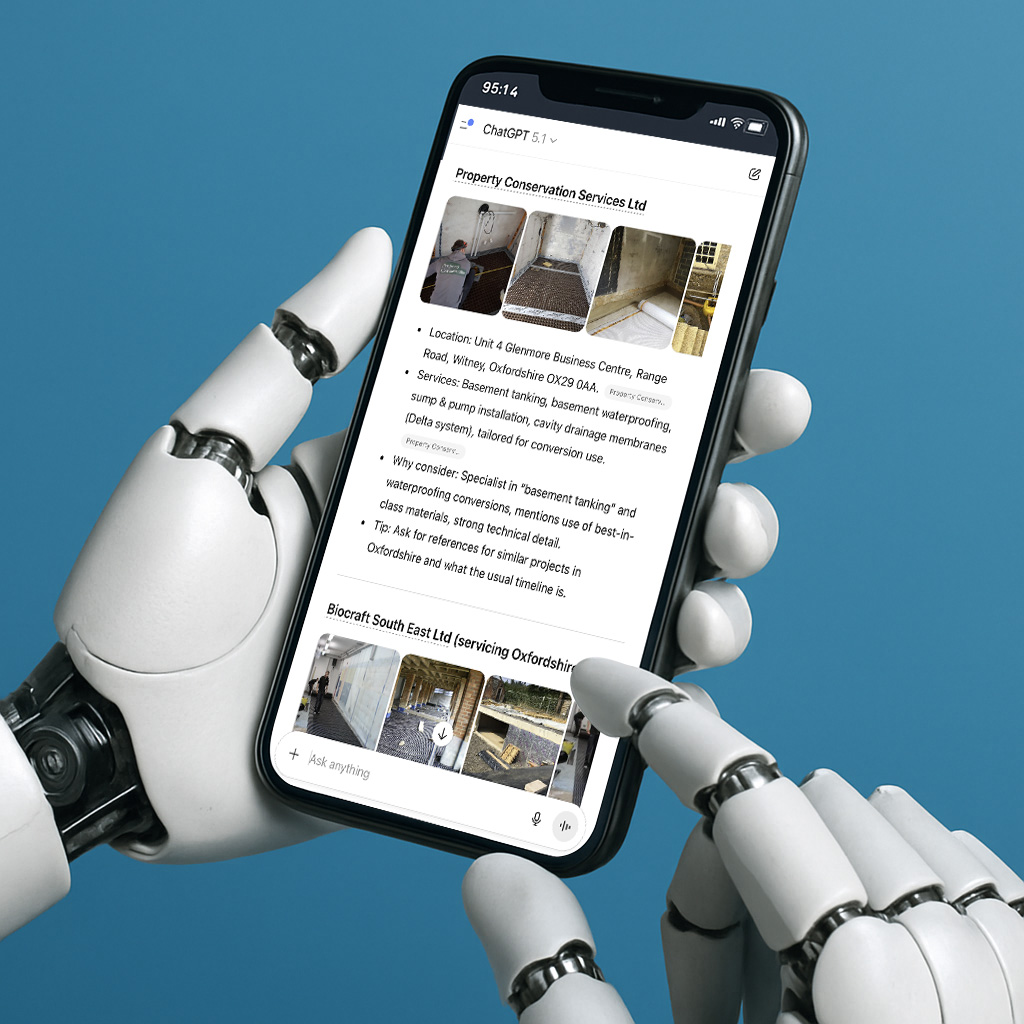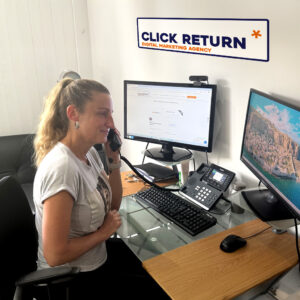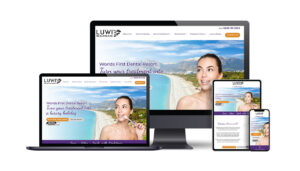Get Chosen by AI
with Generative Engine Optimisation
Get Found By ChatGPT

Search Has Changed. Make Sure Your Brand is Found by AI
With the rise of AI Overviews, large language models (LLMs) like ChatGPT, Gemini and Perplexity along with conversational search, the battle for visibility is no longer just about ranking on Google’s page one, it’s about being the trusted source cited by the AI itself.
As AI reshapes how brands are discovered, success now depends on Generative Engine Optimisation (GEO).
GEO is the strategic process of optimising your digital presence to be selected, cited, and recommended by generative AI engines. It’s how you ensure your brand drives influence and action, even when a user never clicks a traditional blue link.
Don’t let AI choose your competitors. Choose Click Return to make sure AI chooses you.

The Old Way (Traditional SEO)
The New Way (Generative Engine Optimisation)
Goal: Drive clicks from search result pages.
Goal: Drive selection, citation, and recommendation by AI engines.
Focus: Keywords, links, and technical site health.
Focus: E-E-A-T signals, structured data, and conversational content.
Outcome: Ranking in a list of 10 links.
Outcome: Being the single, trusted answer or recommendation.
Why GEO is the Future of Getting Found Online
The shift to AI-driven search is not a trend, it’s a permanent change that impacts your bottom line. Ignoring it means losing valuable traffic and authority to competitors who adapt.
The Impact of AI on Your Business
- Zero Click Dominance: AI Overviews and generative answers are fulfilling user queries directly, reducing traditional organic traffic by an estimated 15% to 25% for unoptimised sites.
- The Authority Factor: Generative AI models are trained to prioritise content that demonstrates high Experience, Expertise, Authoritativeness, and Trustworthiness (E-E-A-T). If your content lacks these signals, it will be overlooked.
- Conversational Commerce: By 2026, a significant portion of information browsing will be screenless (voice assistants, smart devices), making optimisation for AI-driven answers non-negotiable.
Our GEO Services: Built on 20 Years of Trust and Expertise
E-E-A-T Signal Amplification (Experience & Trust)
This is the foundation of all GEO success. AI engines are taught to select the most credible sources. We work to prove your brand’s authority.
- Expert Author Identification: Ensuring all content is clearly attributed to qualified subject matter experts within your organisation, linking to their professional profiles and credentials.
- Trustworthiness Audit: Comprehensive review of your site’s security, privacy policies, and customer service signals to maximise trust scores.
- Experience Integration: Incorporating first-hand, real-world experience into your content (e.g., case studies, reviews, user generated content) to satisfy the “Experience” element of E-E-A-T.
- Digital PR & Citation Building: Strategically earning high authority mentions and citations from trusted industry sources to signal authority to AI models.Digital PR & Citation Building: Strategically earning high authority mentions and citations from trusted industry sources to signal authority to AI models.


Conversational Content & Structure Optimisation (Expertise)
AI models are conversational. Your content must be structured to feed them the clear, concise, and accurate information they need to generate a reliable answer.
- GEO Content Strategy: Restructuring existing content and developing new content specifically designed to answer user questions directly and conversationally.
- Fact Checking & Verifiability: Implementing internal linking and source citation best practices to make your content easily verifiable by AI models, boosting its perceived expertise.
- Multimodal Content Cues: Optimising content for more than just text, including image captions, video transcripts, and structured data that AI can use for multimodal answers.
- FAQ & Q&A Schema Implementation: Using advanced structured data to explicitly tell search engines and AI models the exact question and answer pairs on your site.
Technical GEO & LLM Optimisation (Authoritativeness)
We handle the technical complexities of making your site perfectly crawlable and understandable by the most advanced AI models.
- AI Bot Crawlability: Ensuring your site’s robots.txt and sitemaps are correctly configured to allow AI-specific crawlers to access and index your most authoritative content.
- Knowledge Graph Optimisation: Refining your brand’s presence in Google’s Knowledge Graph and other semantic databases to establish your brand as the definitive source for your industry.
- Entity Optimisation: Clearly defining and linking key entities (people, places, products, concepts) within your content so AI models can accurately understand and cite your information.
- Core Web Vitals for AI: Maintaining exceptional site speed and user experience, as a fast, reliable site is a fundamental trust signal for both users and AI.


GEO Monitoring, Reporting, and Strategy
You can’t optimise what you don’t measure. Our reporting focuses on AI-specific metrics, not just traditional clicks.
Continuous Strategy Refinement: Regular consultations to adapt your GEO strategy based on the rapid evolution of AI search technology.
AI Citation Tracking: Monitoring where, when, and how your brand is being cited in AI Overviews, ChatGPT, and other generative platforms.
Generative Traffic Analysis: Analysing traffic patterns to identify which queries are being fulfilled by AI and which are still driving clicks, allowing for continuous strategy refinement.
Competitor AI Visibility Benchmarking: Tracking your competitors’ presence in AI answers to ensure you maintain a leading edge.
Ready to Get Your Brand Chosen by AI?
The time to act is now. Every day you wait is a day your competitors are establishing their authority in the generative search space.
Click Return is your trusted partner for Generative Engine Optimisation.
Our 3-Step GEO Process

1.
Discovery & E-E-A-T Audit
We begin with a deep dive into your current digital footprint, identifying existing E-E-A-T strengths and weaknesses. We pinpoint where your brand is currently being cited (or missed) by AI engines.

2.
Bespoke GEO Strategy Development
Based on the audit, we craft a tailored strategy focused on your highest-value products and services. This plan outlines the specific content, technical, and authority-building actions required.

3.
Implementation & Optimisation
Our team of experts implements the technical changes, restructures your content for conversational search, and executes the Digital PR strategy to build authority signals. With continuous monitoring & growth.
Our Digital Marketing Services
Strategic digital marketing services that deliver real results for small businesses. Each option below is designed to increase your visibility where it matters most and turn that visibility into growth for your business.
Web Design
Responsive wordpress website design that will look great and are easy for customers to navigate.
SEO
It’s not rocket science to rank high on Google organically. It just takes time & effort to insert the right words in the right places the right number of times, while making your SEO content read naturally.
Paid Marketing
Google ads allows you to instantly buy new traffic. We ensure that you are buying the right customers for the right price so you can make achieve your goals.
Tracking & Web Analytics
Google ads allows you to quickly buy new customers. The challenge is buying the right customers for the right price so you can still make a profit.
Social Media
Grow your brands awareness organically while building on your brands trust with social media will help deliver a higher return from all your marketing channels.
Case Studies
-
New website with great functionality
Luwi Health Care
Aydogan Unal
•
Dental Care
The Overview: The Luwi Health Care is a premier dental clinic with a presence in the UK and Turkey, specialising in providing dental tourism services. They tasked Click Return with a website design and…
-
Streamline and more functional website design and branding
Body Sculpting Clinic
Zal
•
Beauty Clinic
The Overview: The Body Sculpting Clinic is a Premium Non-invasive Beauty Clinic in London, providing an innovative approach to skin tightening and body sculpting treatments. They tasked Click Return with…
-
21% increase in sales 2021 – 2022
Chambers Timber
Dave Timbear
•
Timber Merchant
It was in the first few months of 2021 that we were approached by Chambers Timber – a family-run timber merchant servicing London. They had a website which wasn’t performing…
Testimonials / Reviews
-
“This team is just the best, i have worded with them for over 10 years, I would highly recommend them, don’t hesitant “

Dave Timbear
London
•
Timber Merchant
-
I dipped my toe in the water with Brad with the SEO of my previous website and later hired Click Return to also handle my Google Adwords. When I was ready to update my website they were the natural choice to create it. Brad advised on a WordPress template site that gave me the look I wanted but without the high costs of a bespoke site. I don’t think that anyone ever realises that it isn’t a bespoke site. I have had so many compliments from prospective clients about the website telling me that’s the reason they picked up the phone. I like to think some of that is the photographs of my work! However, I know it’s also to do with the way the site looks and functions. In it’s first year it brought a return that was many times my investment and it has done so every year since. The Click Return team have helped us learn to add to and change the website in house. This gives us control of the basic every day maintenance and means we only need to get the “big guns” in for the hard stuff. In regular phone/on-line meetings Brad advises and guides us with SEO and Adwords so things keep going the way that we need them to. Thanks Brad and Click Return.

Sam Coles
Bedfordshire
•
Lighting Designer
-
I am so grateful for everything that Click Return has achieved with regard to my website. Having attempted to do it myself, I have to admit it was a complete mess. From beginning to end I was impressed with their expertise and professionalism. Everyone on the team was approachable, helpful, and friendly, attributes that were vital for a novice such as me, resulting in a website that far exceeded my expectations. I would highly recommend the training programme. It has given me the confidence to experiment and add to the website whenever needed and their monthly statistics highlight areas that may need improvement and more focus. The difference it has made to my business is tremendous, it will always be a work in progress but I know that help if needed, is only a phone call away. Thank you so very much to everyone on the team.

Peggy Stephanou
Hertfordshire
•
Jewellery
-
Brad is really passionate about SEO. Orchard Recruitment has continued to use Brad at Click Return to drive our SEO strategy and specifically PPC campaigns for individual recruitment campaigns. He takes the pain out of SEO and can do in an hour what would take most normal mortals a few days. Money well spent allowing us to focus on what we are good at…winning recruitment business and identifying great candidates. If I wanted to spend hours pouring over Excel spread sheets, I’d be doing what Brad does. No, let Brad and his team take the strain. I can highly recommend Brad Bishop and his team at Click Return to you.

Karla Cretten
Hertfordshire
•
Recruitment
-
We have been working with the team at Click Return for over 20 years now and they work on a number of areas of our business – they manage our PPC advertising, email marketing and also our competitions. 2016 saw the launch of our latest catalogue, our previous one having been published in 2012. Brad was hugely involved in the production of it, from setting it, running the online competition to find a photograph for the front cover to producing a digital version of it. He also had a large input into the production of our AKM – our workshop manual. We now have their designer, Stuart, in our office two days a week which is great as he really gets to know our business and what we are looking at for our designs. Stuart creates numerous original animated banners for us, designs t-shirts, product packaging and artwork for our competitions and events. We have always received a prompt service from Click Return and would highly recommend them.

Justin Jeffrey
Hertfordshire
•
Mini Spare Parts
-
Brad has always been friendly, approachable and extremely knowledgeable on all things relating to digital marketing. Hill Upholstery & Design have been clients of Click Return for two years now, and we have always found Brad’s advice and guidance invaluable. The work to promote our website via Google has helped us to grow our business significantly and Brad (& his team) has made online marketing one less element to worry about.

Helen Fidgeon
Essex
•
Upholstery & Design
-
Can’t fault Click Return, great customer service, technical knowledge, and a hands on professional, efficient service. The proof was in the results as our business performance on Google and customer enquiries spiralled.

Charlotte Endacott
West Sussex
•
Baby Clothing
-
Brad has undertaken work for us over quite a few years now and we keep coming back which is testament to the satisfaction and results we have received. I have experienced Brads skills on SEO marketing, web site building and web site maintenance on various campaigns. The amount of research and work behind the scenes Brad does is amazing and you can see that this works by the results we have experienced. By following the advice and practices our enquiries increased, our conversion rate increased, and therefore our profit increased. Many thanks and long may this relationship continue.

Earl Franklin
Kent
•
Insurance
-
Brad gave great insight into our current website and helped us change this to make it a more proactive platform. Him and his team now expertly manage driving new clients to our website and we have had a significant increase in sign-ups. This has been a huge help to us and our business.

Daniel Taylor-Lund
London
•
Fieldwork Agency
Why Choose Click Return

Experience
We have been helping our clients achieve online success for 20 years through paid advertising, Search Engine Optimisation and creating new websites. Our efforts have helped our clients generate a combined conversion value of over £250 million so you can be reassured we know what we are doing!
Trust
We are driven by the success of our clients, and sit regular Google exams to maintain our Google Partner status, ensuring all clients generate a big return! Don't just take our word for it though, we have plenty of client testimonials on our website which we encourage you to see.
Our Promise
At Click Return we are passionate about good marketing and believe all clients should make money online. That's why we promise quality digital marketing services that will actually make you money. We are confident about upholding this promise and don't believe in tying any client down to long term contracts.
Faqs
A landing page in PPC is the web page users are taken to after clicking on your ad. It’s essential for converting visitors into customers. A landing page in PPC is a dedicated web page that users are directed to after clicking on your Pay-Per-Click ad. It’s a critical component in digital marketing, especially in PPC campaigns, because it serves as the next step in the customer journey after they have shown interest by clicking on your ad. The primary goal of a landing page is to convert visitors into leads or customers by encouraging them to take a specific Results from PPC can be seen almost immediately after a campaign goes live, but optimising for the best performance may take a few weeks of data gathering and adjustments. When launching a Pay-Per-Click (PPC) campaign, one of the most common questions is, “How long does it take to see results from PPC?” The answer can vary depending on several factors, but the beauty of PPC advertising is that results can be seen almost immediately once the campaign goes live. However, achieving optimal performance often requires time, data gathering, and continuous adjustments, meaning that the best outcomes usually appear after a To improve PPC Campaign ROI, you can focus on optimising your ads, targeting the right audience, refining your keywords, and improving your landing pages to increase conversions. Improving the Return on Investment (ROI) from your Pay-Per-Click (PPC) campaign is crucial for maximising the effectiveness of your advertising budget. Achieving better ROI means you’re getting more conversions and revenue relative to what you’re spending on your ads. While PPC can drive fast results, making it profitable over the long term requires ongoing optimisation and strategy adjustments. To increase your PPC campaign ROI, it’s essential to focus on optimising your ads, targeting PPC performance can be tracked using analytics tools like Google Analytics or platform-specific dashboards that track metrics like clicks, impressions, CTR, conversions, and ROI. Tracking the performance of a PPC (Pay-Per-Click) campaign is essential for understanding how well your ads are driving results and achieving your business objectives. To maximise the effectiveness of your PPC efforts, it’s crucial to monitor key performance indicators (KPIs) and use the right tools to gather and analyse data. By tracking PPC performance regularly, you can make informed decisions to optimise your campaigns, reduce wasted ad spend, and ultimately improve your return on investment (ROI). Negative keywords prevent your ad from showing for irrelevant searches. This helps you avoid paying for clicks that won’t convert. In Pay-Per-Click (PPC) advertising, negative keywords play a crucial role in ensuring that your ads are shown only to relevant audiences. Negative keywords are terms or phrases that you specify in your PPC campaigns to prevent your ads from appearing when those specific words are used in a search query. By using negative keywords effectively, you can refine your audience targeting, reduce wasted ad spend, and improve the overall performance of your campaigns. The Purpose of Negative Keywords The primary CTR is the ratio of clicks to impressions, showing how often people click on your ad after seeing it. A high CTR indicates that your ad is relevant and engaging. Click-Through Rate (CTR) is one of the most important metrics used in Pay-Per-Click (PPC) advertising and other forms of digital marketing. It measures the ratio of people who click on an ad compared to the total number of times the ad is shown, or its impressions. Click-Through Rate is expressed as a percentage and is calculated by dividing the number of clicks by the number of impressions and then multiplying Keyword research involves identifying the terms and phrases people use in search engines when looking for information related to your business. By targeting the right keywords, you can attract relevant traffic to your site. Tools like Google Keyword Planner, Ahrefs, and SEMrush are commonly used for this process. So, how does keyword research work? It is a foundational aspect of SEO that involves discovering the specific words and phrases people use when searching for information, products, or services related to your business. Understanding these terms allows you to optimise your website’s content to align with the search queries your potential PPC (Pay-Per-Click) is a digital advertising model where advertisers pay a fee each time their ad is clicked. Essentially, you’re buying visits to your website, rather than earning them organically. Google Ads and Facebook Ads are popular PPC platforms. PPC (Pay-Per-Click) advertising is a widely used digital marketing model in which advertisers pay a fee each time someone clicks on their online ad. Essentially, instead of earning website visits organically through methods like search engine optimisation (SEO) or social media marketing, advertisers pay for traffic to their site. This model allows businesses to gain instant visibility on search engines or PPC works by bidding on specific keywords or target demographics. When users search for those keywords or match your target criteria, your ad may appear. If the user clicks on the ad, you pay a set amount based on your bid and the competition for that keyword. How does PPC work? PPC (Pay-Per-Click) advertising operates on a bidding system, where businesses bid on specific keywords or target demographics in order to have their ads displayed to potential customers. The primary idea behind PPC is that advertisers only pay when a user clicks on their ad, making it a cost-effective method PPC costs vary based on several factors like the platform, industry, competition for keywords, and targeting options. On average, Google Ads can cost anywhere from a few cents to several dollars per click, depending on how competitive the keyword is. How much does PPC advertising cost? PPC (Pay-Per-Click) advertising costs can vary widely based on several factors, making it essential for businesses to understand how the pricing structure works before launching a campaign. The cost per click (CPC) is not fixed but is influenced by a combination of elements like the platform used, the industry or niche you operate in, Quality Score is a metric used by Google to rate the quality and relevance of your ads, keywords, and landing pages. Higher Quality Scores can lead to lower CPCs and better ad positioning. Understanding Google Ads Quality Score Quality Score is one of the most crucial metrics in Google Ads, playing a significant role in determining the success and cost-efficiency of a PPC (Pay-Per-Click) campaign. In simple terms, Quality Score is a measure used by Google to assess the quality and relevance of your ads, keywords, and landing pages in relation to a user’s search query. This score ranges from Ad relevance measures how closely your ad matches the search intent of users and how relevant it is to the keywords you’re targeting. Understanding Ad Relevance in PPC Advertising Ad relevance is a critical metric in PPC (Pay-Per-Click) advertising, especially in platforms like Google Ads, where it plays a significant role in determining the overall effectiveness of your campaigns. In essence, ad relevance measures how closely your ad copy aligns with the intent behind a user’s search query and how relevant it is to the keywords you are targeting. This concept is vital because the more relevant your ad is A conversion is a desired action taken by a user after clicking an ad, such as making a purchase, signing up for a newsletter, or filling out a contact form. Understanding Conversions in PPC Advertising In the world of Pay-Per-Click advertising, a ppc conversion refers to a specific action that you want users to take after they engage with your ad. This action can vary depending on the goals of the campaign, but it usually aligns with a business’s objectives, such as increasing sales, generating leads, or building brand awareness. Common examples of conversions include making a purchase, signing up Absolutely. We can geo target your ads by country, city, or even a specific radius, and run them during business hours or peak conversion times. SEO is about earning organic rankings, which takes time. Search Ads put you at the top instantly, and are ideal for generating leads while SEO builds. Many clients begin receiving enquiries within the first few days of going live. Performance improves over time with ongoing optimisation.




